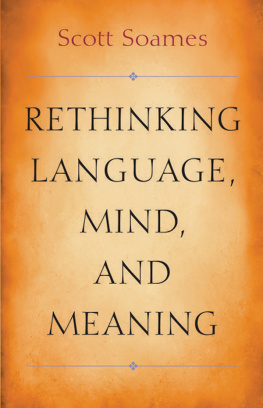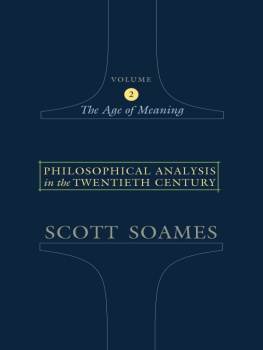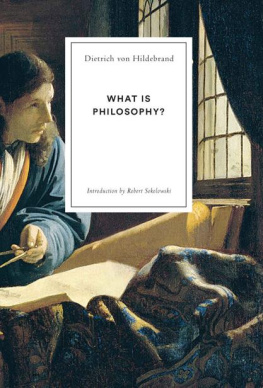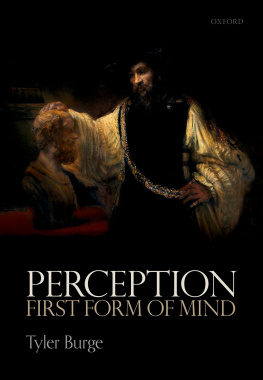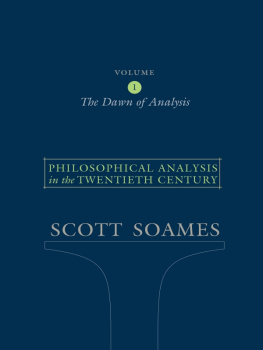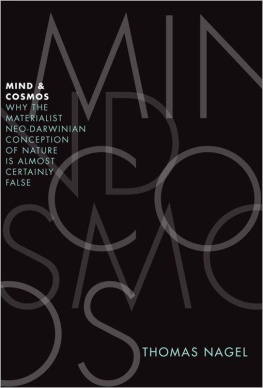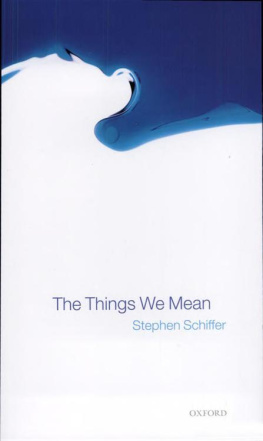
Rethinking Language, Mind, and Meaning

T HE C ARL G . H EMPEL L ECTURE S ERIES
Rethinking Language, Mind, and Meaning

SCOTT SOAMES
PRINCETON UNIVERSITY PRESS
PRINCETON AND OXFORD
Copyright 2015 by Princeton University Press
Published by Princeton University Press, 41 William Street, Princeton, New Jersey 08540
In the United Kingdom: Princeton University Press, 6 Oxford Street, Woodstock, Oxfordshire OX20 1TW
press.princeton.edu
All Rights Reserved
Library of Congress Cataloging-in-Publication Data
Soames, Scott.
Rethinking language, mind, and meaning / Scott Soames.
pages cm.(The Carl G. Hempel lecture series)
Includes bibliographical references and index.
ISBN 978-0-691-16045-0 (hardcover : alk. paper)
1. Thought and thinking. 2. Cognition. 3. Perception. 4. Meaning (Psychology) 5. Proposition (Logic) I. Title.
BF441.S635 2015
121'.68dc23
2014023268
British Library Cataloging-in-Publication Data is available
This book has been composed in Charis SIL
Printed on acid-free paper.
Printed in the United States of America
1 3 5 7 9 10 8 6 4 2
FOR
MARTHA, GREG, AND BRIAN

ACKNOWLEDGMENTS

T hank you to the Philosophy Department of Princeton University for inviting me to give the Hempel Lectures in 2013 and to Princeton University Press for inviting me to do this book based on those lectures. Thanks also to all the friends, colleagues, and students who made my years at Princeton so rich, and to my wife Martha, who has made my post-Princeton years richer.
Rethinking Language, Mind, and Meaning
CHAPTER 1
The Need for New Foundations

I n this book, I will argue that the revolution in the study of language, mind, and meaning led by advances in philosophical logic from Frege through Tarski, Kripke, Montague, and Kaplan must be reconceptualized. Although much progress has been made by adapting intensional logic to the study of natural language, the resulting theoretical framework has limitations that require rethinking much of what has guided us up to now. I will begin by sketching where we are in the study of linguistic meaning and how we got there, after which I will identify three main ways in which I believe the current theoretical framework must change.
The story begins with the development of symbolic logic by Gottlob Frege and Bertrand Russell at the end of the nineteenth and beginning of the twentieth centuries. Initially, their goal was to answer two questions in the philosophy of mathematics: What is the source of mathematical knowledge? and What are numbers? They answered (roughly) that logic is the source of mathematical knowledge, that zero is the set of concepts true of nothing, that one is the set of concepts true something, and only that thing, that two is the set of concepts true of some distinct x and y, and nothing else, and so on. Since the concept being non-self-identical is true of nothing, it is a member of zero; since the concept being the Hempel lecturer in 2013 is true of me and only me, it is a member of the number one; since the concept being my son is true of Greg and Brian Soames, and only them, it is a member of the number two. Other integers follow in train. Since numbers are sets of concepts, the successor of a number n is the set of concepts F such that for some x of which F is true, the concept being an F which is not identical to x is a member of n. Natural numbers are defined as those things that are members of every set that contains zero, and that, whenever it contains something, always contains its successor. Multiplication is defined as repeated addition, while addition is defined as repeated application of the successor function. In this way arithmetic was derived from what Frege and Russell took to be pure logic. When, in similar fashion, classical results of higher mathematics were derived from arithmetic, it was thought that all classical mathematics could be so generated. So, logic was seen the foundation of all mathematical knowledge.
That, at any rate, was the breathtaking dream of Frege and Russell. The reality was more complicated. Their first step was the development of the predicate calculus (of first and higher orders), which combined truth-functional logic, familiar from the Stoics onward, with a powerful new account of generality supplanting the more limited syllogistic logic dating back to Aristotle. The key move was to trade the subject/predicate distinction of syllogistic logic for an expanded version of the function/argument distinction from mathematics. Applied to quantification, this meant treating the claim that something is F as predicating being true of something of the property being F or, in Russells convenient formulation, of the function that maps an object onto the proposition that it is F, while treating the claim that everything is F as predicating being true of each object of that property or function. The crucial point, resulting in a vast increase in expressive power, is the analysis of all and some as
Although the first-order fragment of Freges system was sound and completein the sense of proving all and only genuine logical truthsthe concepts needed to define and prove this (while also proving that the higher-order system was sound but, like all such systems, incomplete) were still fifty years away. In itself, this didnt defeat the reduction of mathematics to logic. More serious was the intertwining of this early stage of modern logic with what we now call nave set theoryaccording to which for every stateable condition on objects there is a set (perhaps empty, perhaps not) of all and only the things satisfying it. To think of this as a principle of logic is to think that talk of somethings being so-and-so is interchangeable with talk of its being in the set of so-and-sos.
When Russells paradox demonstrated the contradiction at the heart of this system, it quickly became clear that the principles required to generate sets without falling into contradiction are less obvious, and open to greater doubt, than the arithmetical principles that Frege and Russell hoped to derive from them. This undercut the initial epistemological motivation for reducing mathematics to logic. Partly for this reason, the subsequent boundary that grew up between logic and set theory was one in which the latter came to be viewed as itself an elementary mathematical theory, rather than a part of logic. Reductions of mathematical theories to set theory could still be done, with illuminating results for the foundations of mathematics, but the philosophical payoff was not what Frege and Russell initially hoped for.
This philosophical shortcoming was compensated by the birth of new deductive disciplinesproof theory and model theoryto study the powerful new logical systems that had been developed. A modern system of logic consists of a formally defined language, plus a proof procedure, often in the form of a set of axioms and rules of inference. A proof is a finite sequence of lines each of which is an axiom or a formula obtainable from earlier lines by inference rules. Whether or not something counts as a proof is decidable merely by inspecting the formula on each line, and determining whether it is an axiom, and, if it isnt, whether it bears the structural relation to earlier lines required by the rules. Since these are trivially decidable questions, it can always be decided whether something counts as a proof, thus forestalling the need to prove that something is a proof. In a purely logical (first-order) system, the aim is to prove all and only the
Next page
